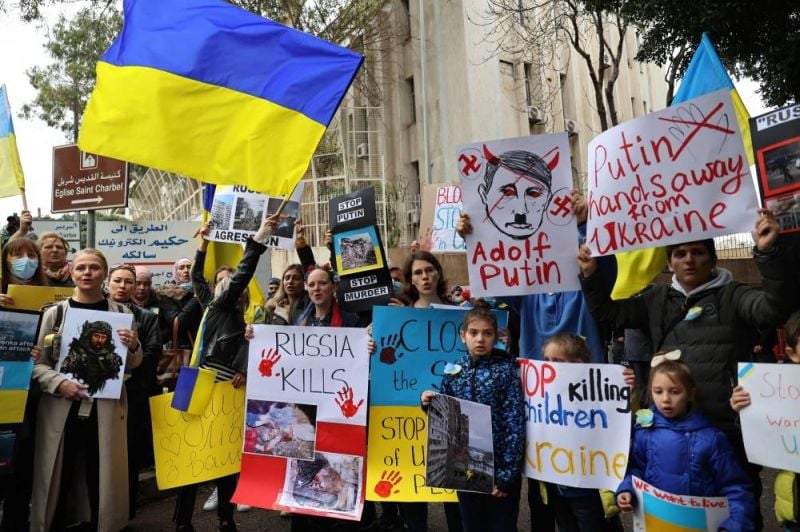
Lebanese join Ukrainians living in Lebanon during a protest against Russia's invasion of Ukraine, outside the Russian Embassy in Beirut, on Wednesday. (Credit: Anwar Amro/AFP)
The Lebanese lira dropped sharply t0 LL24,000 to the US dollar on the parallel market yesterday. The sudden fall, after around a month of stability, came after several commercial banks stopped selling US dollars to customers at the central bank’s Sayrafa rate. The banks did so by lowering their clients’ daily dollar quotas, which caused them to seek dollars from other banks, and the ensuing panic buying caused the lira to drop by 12 percent. Several banking sources told L’Orient Today that the daily quota of dollars they received from Banque du Liban were depleted within a few hours, and 0ther banks told their corporate clients that it was no longer possible to purchase US dollars at the Sayrafa rate, driving fears that Circular 161 would soon come to an end. In response, BDL released a statement saying that it is still selling US dollars in unlimited quantities to banks and would continue to do so “without a ceiling” through the Sayrafa exchange platform. Circular 161 stipulates that customers can exchange their “lollars” at banks for cash US dollars at the Sayrafa rate, and has been extended several times. It has led to relative stability for the lira, with its exchange rate hovering around LL20,000 to the US dollar for over a month, after peaking at LL33,000 on Jan 11. Separately, BDL has asked banks to hand in their list of names of politically exposed clients who have not repatriated money sent abroad. It added that “cash deposits made between July 2017 and end-December 2020 are concerned as well, if the beneficiary is” a politically exposed person. BDL gave the banks until the end of March to submit this information.
During an official trip to Cairo, Foreign Minister Abdallah Bou Habib urged Arab unity amid the ongoing Russian invasion of Ukraine. Bou Habib, whose comments came during a meeting of the Ministerial Council of the Arab League, said that the war requires more coordination and solidarity between Arab countries “to ensure minimum food and energy needs.” Lebanon has consistently sided with Ukraine, both in official statements and at the United Nations. However, Lebanon’s official position has come under scrutiny by some on the domestic political scene, most notably Hezbollah leader Hassan Nasrallah, who blasted the Foreign Ministry’s pro-Ukraine statement in a televised address on Tuesday, saying that it “was written at the American Embassy.”
International Court of Justice Judge Nawwaf Salam has announced that he will not run for Parliament in the upcoming May 15 elections. In a tweet yesterday, Salam denied that he was hoping to win a seat in Parliament. “My concerns go beyond that,” the tweet read. Salam’s tweet did map out a vision for the future of the country, which some have interpreted as future aspirations for the premiership of the country. In the wake of the Oct. 17 protest movement, Salam was tipped earlier to lead a government, even receiving the support of Progressive Socialist Party leader Walid Joumblatt. However, his potential leadership continues to receive objections from Hezbollah. The news came one day after journalist Jad Ghosn announced that he was running for Parliament in the Metn district with opposition group Citizens in a State, led by former Minister Charbel Nahhas.
The syndicate of traders and importers of fresh, chilled and frozen meat warned of meat shortages yesterday if Banque du Liban does not pay suppliers before Ramadan. In a statement, the syndicate said that the lack of payments would lead to the closure of farms and meat warehouses, and the cessation of meat imports all together. In addition to the lack of payments, the syndicate blamed rising fuel prices and transport costs, as well as the increase of meat and livestock prices internationally for the potential shortages. The syndicate urged those in the know to intervene or risk harming the interests of importers and traders. The news adds more stress to Lebanon’s deteriorating food security. Last week, flour mills began limiting deliveries to bakeries that produce Arabic bread. Economy Minister Amin Salam has said that the current wheat reserves should last Lebanon a month and a half; this was reiterated this week by Industry Minister George Bouchikian.
In case you missed it, here’s our must-read story from yesterday: “Rising water and falling snow: A tented settlement’s annual battle against the elements”